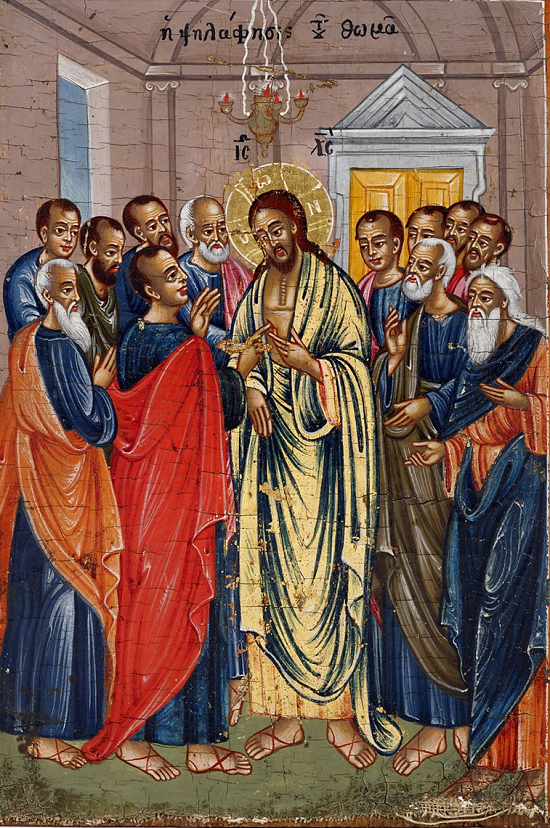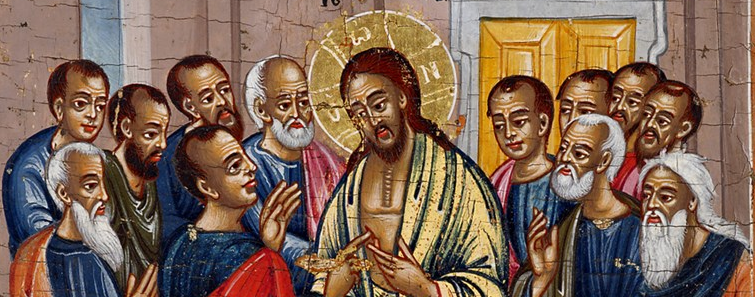Have You Seen the Risen Christ?
Second Sunday of Easter Scripture Readings

“The disciples rejoiced when they saw the Lord.” Since that day (and John tells us it was the day of Christ’s Resurrection), people have wondered and speculated what it must have been like to be among the disciples in that room that evening. Just about all we can surmise about Jesus’s resurrected body comes from the gospel reading we were given today and the other descriptions of his appearances to the disciples. What can we learn? The resurrected body of Jesus had some similarities to his physical body and some differences. The differences seem to be most obvious. The gospel writers all tell us that, at least at first, the disciples and the faithful women who followed Jesus had difficulty recognizing him after the resurrection. Was it because no one was expecting to see him alive, or was his appearance changed? It would seem that his looks were at least somewhat transformed. Also, his body had shed some of the physical characteristics it once had. The eyewitnesses testified that he had appeared and disappeared several times, even in the locked room where the disciples had gathered.
Yet, the gospels are also very clear that Jesus’s resurrected body was neither a mirage nor an insubstantial specter. Mary Magdalene put her arms around Jesus’s legs when he spoke her name. Luke’s gospel says that he invited the disciples to touch him and see that he was flesh and bone, and he ate a piece of broiled fish. But it was John who describes for us the wounded body of Christ. It was of primary importance to the disciples that everyone should know that the Christ of the resurrection was the same Jesus who taught and healed, suffered and died. Therefore, the first lesson we might take away from today’s gospel reading is an understanding of our own resurrected life. We must not be ashamed of our woundedness—for we are all wounded in some way. We shouldn’t think that we will cease to be when our physical body lies in death. Like Jesus, we will not only retain our personal integrity but, also like him, we will be recognizable by our wounds.
There is another theme running through this gospel text. For John, Jesus’s resurrection, return to the Father, and his bestowal of the Holy Spirit are all the same event. His description of it forms, as it were, bookends to his entire gospel. In his Prologue, he describes how the creative Word of God became flesh and blood and dwelt among us. In today’s gospel, the eternal Word becomes further incarnate as Jesus bestows the Holy Spirit on the disciples not just to carry on his work, but to be him in the world. That, after all, is what Jesus prayed for at the Last Supper: “I pray that they may be one in us, that the world may believe that you sent me. I have given them the glory you gave me that they may be one, as we are one—I living in them, you living in me—that their unity may be complete” [John 17:21-23].
It is the gift of the Holy Spirit who raised the Lord Jesus from the dead that was given to us, his disciples, so that we might share in the very life of the Father right here and now. We need to consider this carefully. Through faith, we are joined to Christ. By setting aside our own selfish, self-centered lives, we join him in his death. We resign as general managers of the universe and find ourselves transformed and transfigured, allowing the power of God to guide us and remake us into something altogether new and different. As such, we are freed from sin—not from sin as bad behavior, but from sin as an attitude of arrogant self-reliance. We learn to let go, to accept reality as it is, and to surrender to the will of God as it manifests itself to us. In that, we find a life of meaning and direction that no one and no thing can take from us—not even death itself.
Jesus showed his disciples his wounds. He invited the skeptic in their midst to touch him and see for himself. Yet once the Spirit of God, the Holy Spirit, was given to the disciples, the ministry of the man Jesus was at an end. I’ll ask again: have you ever wondered what it would have been like being locked in that room with the disciples? Did you ever think that things might have been different if you’d seen the risen Jesus yourself? I don’t think anything would change. Why? Because his disciples have been given his spirit. He is alive in his disciples, and he shows himself to the world in them. Like Thomas and the other doubting, hesitant disciples, our faith was planted by our contact with him and grew through our first blind acceptance of what we were taught, through a tentative understanding of the life and ministry of Jesus, then through periods of skepticism and doubt, through trauma and despair, finally arriving at an experience of the transforming power of God’s grace. Through it all, the wounded body of Christ is still among us, still active, still breathing the creative spirit of God into our lives, even when darkness covered the face of the deep.
We are “Church,” in Greek εκκλησια (ekklēsia) meaning those who have been called out. We’ve been called out to be the wounded body of Christ. It’s our acceptance, surrender, and gratitude, despite our woundedness, that shows the world the risen Christ. As the first letter of Peter states in our second reading this morning, “…[we] rejoice with an indescribable and glorious joy as [we] attain the goal of [our] faith, the salvation of [our] souls.” We mustn’t think of our souls as disembodied spirits set free from the fires of hell. That’s not what salvation is. Salvation is discovering through surrender to the will of God an indelible meaning, purpose, and direction in a life once overshadowed by emptiness and futility.
Still, there is a concern. When we, the body of Christ, raised up by the power of the Holy Spirit, fail in our calling to show that body to the world, who can see him? Who will recognize him? Who will believe? The Holy Spirit cannot abandon the body of Christ, the Church, but the Church can turn from the Holy Spirit, and has, from time to time, throughout history. It’s only our surrender to the power of the Holy Spirit living within us that allows the world to see beyond our woundedness and the terrible things that have been done in Christ’s name and see the power and glory that is our inheritance as his disciples and the eternal life he has bestowed upon us and upon all who follow him.
Get articles from H. Les Brown delivered to your email inbox.
